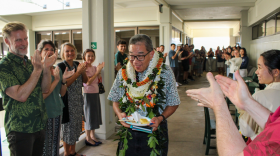Over a year ago, Gov. Josh Green issued an emergency proclamation on affordable housing to address the high cost of living in Hawaiʻi.
Nine affordable housing projects, decided by the Hawaiʻi Housing Finance & Development Corporation director, have received building exemptions through the governor’s proclamation.
So far, over 4,500 units on Oʻahu, Kauaʻi and Maui have received building exemptions.
“What it did do was draw attention to a few issues that are fairly important,” said Sterling Higa, the executive director of Housing Hawaiʻi’s Future. “One of those issues was impact fees of various kinds, especially the school impact fee.”
School impact fee
Six of the nine exemptions through the emergency proclamation were for the school impact fee. It is levied on residential units in four areas that were expected to have large population growth due to increased development: West Maui, Central Maui, Leeward Oʻahu, and Ala Moana to Kalihi.
Officials anticipate the increase in housing stock would create an influx of children in those areas and would overwhelm public schools.

Developers building in those areas would need to pay the Department of Education a school impact fee before getting their building permits. Depending on the area and type of residence, it can cost between about $2,000 and $5,000 per unit.
The collected fees then go into a fund that would be used to build new schools.
“None of it has been spent up until this day,” said Cheri Nakamura, policy and program officer at the Hawaiʻi School Facilities Authority.
The authority took over administration of the school impact fees from the DOE in June. There is currently about $18 million in the account — all of which is unspent.
“It costs probably maybe $200 million to build a new school or more and it is a very small contribution,” Nakamura said. “So the question is whether or not that benefit of added funds is worth the cost of administering the program.”
There is only one person at the School Facilities Authority that processes all of the state’s school impact fees.
The Department of Education did not respond to questions from HPR about its past management of the funds.
Effectiveness of the funds
A 2019 state audit of the program highlighted issues with the collection of the school impact fee, but also unclear methodology from the DOE in determining the affected locations.
For example, Hawaiʻi County refused to cooperate with the state. Even though there is a school impact district on Hawaiʻi Island, there has never been a collection of those funds.
There are some narrow carve-outs for certain developments in school impact districts, such as senior housing, that wouldn’t involve children. Some affordable housing projects through the Hawaiʻi Community Development Authority were developed on state land.
Rep. Luke Evslin introduced a measure last legislative session that would have excluded all housing projects for those making 140% of the annual median income or lower, as well as those living in additional dwelling units. However, the bill died after the Senate didn't schedule a meeting for it.
“When it's already so hard to build housing, we shouldn't be adding new barriers to housing,” Evslin said.
“I think that it's important to be funding new school construction, but I think all taxpayers should bear that burden and not just essentially new homeowners. So I personally don't like the school impact fee — even if it were getting used. And the fact that it's not getting used, I think, makes it even more clear that we need to repeal it.”
Sen. Stanley Chang who chairs the Senate Committee on Housing also wanted to see the school impact fee addressed.
“One of the main reasons why housing is so expensive in Hawaiʻi is that there are so many fees and permits and bureaucratic processes that a home builder has to go through,” Chang said.
“The school impact fee is just one of them. It's not the only one, but if we're going to be serious about reducing prices for new construction for housing here in Hawaiʻi, then the school impact fee is going to be one of those fees that we're going to have to peel back," he said.
Moving forward with exemptions
Catholic Charities was able to get a school impact fee exemption through the governor’s emergency proclamation to build a 179-unit affordable rental project in Kahalui on Maui.

“With the urgent demand for affordable housing on Maui following the wildfire tragedy, we are grateful for the exemption to our project's school impact fee through the governor's affordable housing emergency proclamation,” wrote Rob Van Tassell, Catholic Charities Hawaiʻi CEO, in a statement.
“Any cost savings in constructing our Hale Pilina affordable rental project for low income families will benefit its future tenants," he said.
Nakamura was concerned about another looming deadline. The school impact fees also have a 20-year time limit. That means starting in 2031, the unspent funds will need to be returned to those who paid it.
Other projects that received building exemptions through the governor’s emergency proclamation include two that will not have to go before a county council for approval and instead go through the county planning director. Another would be allowed to build residential units in a commercial-zoned area.






